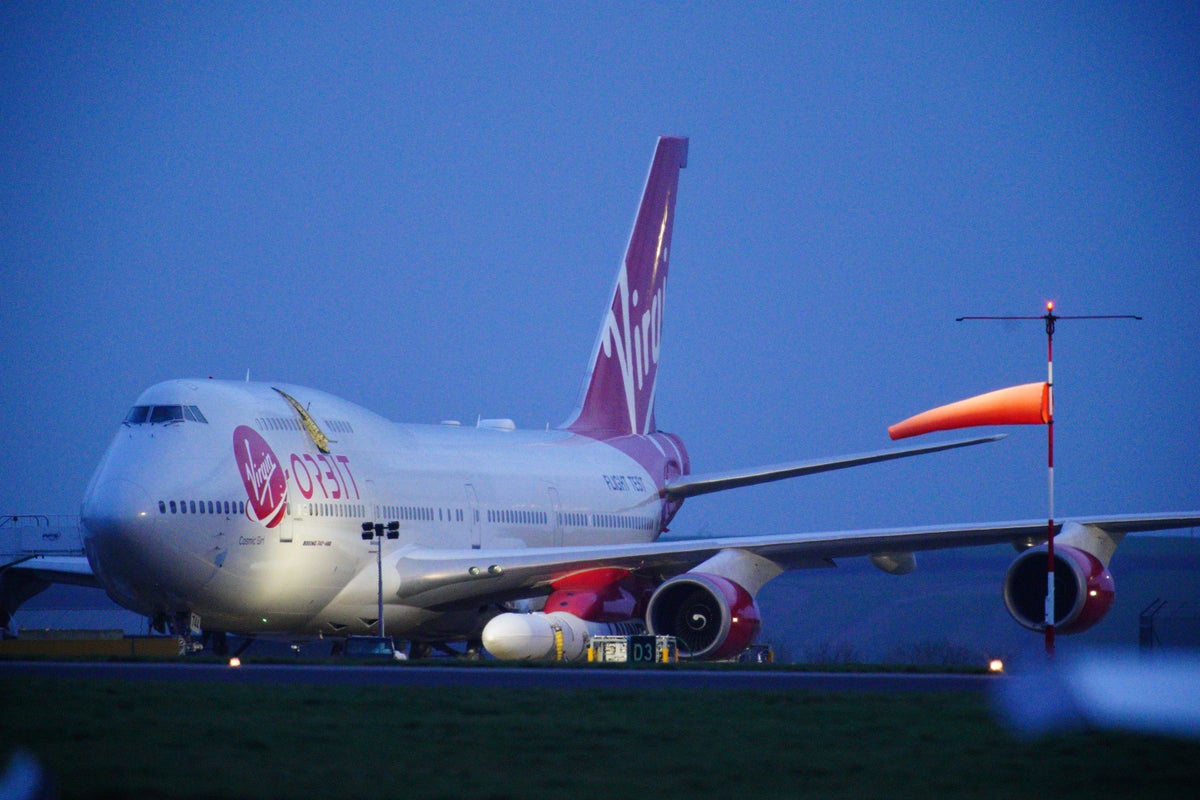
Time is running out for the Government to turn the UK’s ambitions for space launches from home soil into reality, MPs have said.
In a new report published by the Commons Science, Innovation and Technology Committee, a cross-party group of MPs has criticised the “disjointed approach” to Britain’s space policy which, they said, is hampering launch potential.
It said that the UK is on the cusp of establishing Europe’s first small satellite orbital launch capability – but its first attempt did not succeed.
Sir Richard Branson’s Virgin Orbit’s rocket, which blasted off from Cornwall on January 9, did not reach orbit and its payload of small satellites was lost.
The MPs said a UK satellite launch sector can help strengthen the country’s position in the design and manufacture of small satellites, but the Government needs to act fast.
The report stated: “Time is running out in this Parliament for the Government to translate high-level ambitions into practical plans.
“There is now not a moment to lose if the UK is to realise the full potential of this extraordinary sector, which is booming worldwide, and in which we have a world class capability and reputation.”
Last year, the UK’s space sector added £7 billion in value to the UK economy, while turnover from space organisations reached £17.5 billion.
The global space economy market is valued at £355 billion, and could grow to £760 billion by 2030.
The report also expressed concern about the licensing delays that led to the Virgin Orbit launch being postponed.
Virgin Orbit and some of its satellite customers were critical of the UK regulatory process, which was led by the Civil Aviation Authority.
But the committee concluded there was no evidence that the regulatory system contributed to the failure of the Virgin Orbit.
The UK must act urgently to apply the lessons of the Cornwall disappointment to the regulatory system for satellite launch— Greg Clark
The report did state, however, that there is “insufficient co-ordination between the large number of regulatory bodies involved in licensing launches, and this continues to place unnecessary burdens of complexity and administration on companies”.
The MPs are calling on the Government to take steps to improve the licensing system of UK satellite launch.
They also want an investigation to see whether regulations in the Space Industry Act 2018 – which was passed by Parliament in anticipation of the launch – needed to be amended.
Greg Clark MP, chairman of the Science, Innovation & Technology Committee, said: “The UK has huge opportunities in the burgeoning space and satellite industry.
“But the sector is global and fast-paced, and to maintain our position the UK must act urgently to apply the lessons of the Cornwall disappointment to the regulatory system for satellite launch.”
Tim Johnson, director of space regulation at the UK Civil Aviation Authority, said: “The UK is on the cusp of home grown space launches and this report is both timely and welcome.
“The next 12 months will be a very exciting time for the UK space sector and the Civil Aviation Authority is playing a central and vital role making space activity safe.
“We welcome the recommendations to further streamline and simplify the space licensing process and have made significant improvements already, with many more to come.”
The MPs also said the UK needs to publish its Position, Navigation and Timing (PNT) capabilities – global navigation services needed for critical national infrastructure and defence purposes.
The report said: “The Government continues to delay key decisions that need to be made about the UK’s critical Position, Navigation and Timing capabilities.
“It has long promised to update its PNT strategy but work on this topic has been passed between departments and teams and is yet to amount to any meaningful plan.
“This demonstrates how the disjointed approach to leadership of the UK’s space and satellite sector is hampering progress on important matters.
“The Government should not delay the publication of its Position, Navigation and Timing Strategy any further.”
The report also said that the National Space Council, which was abolished and then re-announced as an inter-ministerial group, is yet to meet for the first time and its responsibilities remain unclear.
A Government spokesperson said: “The UK space sector is thriving, employing almost 49,000 people.
“The latest data shows it generated an income of £17.5 billion in 2021 – a £1 billion increase on the previous year.
“The Government remains committed to supporting the development of a dynamic UK spaceflight sector.
“Our world-leading regulations are responsive to changing demands, and our £50m investment is on track to deliver more orbital launches from next year.
“All this work is designed to make the UK the leading provider of commercial small satellite launch in Europe by 2030, generating more jobs and growth across the country.”







